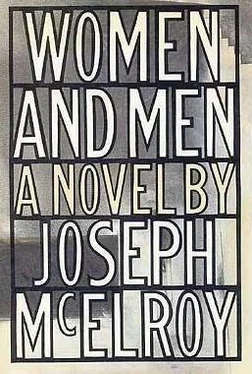They’re both talking low and fast along the edge of the City’s engine, their separate urgencies splayed outward from the point of a city sidewalk where passersby like blind people who knew where their lunchroom would ultimately be found parted to let them stand where they were. Well, T.W. had been still going to meet Spence up the track a ways though the track was always curving, but he had detoured after a ghost in the flesh and lost her and thought that in the crowd crossing the street he’d overshot her even with the distinctive headgear she had on and looked back and then really lost her only to find Spence. Spence said it didn’t matter now, and T.W. said he was delaying his Trace Window trip to Portland where a sadomasochistic businesswoman who’s a quarter Kwakiutl and her very young slave-husband who she’s afraid is going through some changes and causing her a load of suffering had contracted T.W. for an on-the-spot body-reading hoping to develop potential residue trace as power versus poison and had kept it secret because no one in the northwest coast believed them. Spence said he felt he had been led all day, beginning with an old person he had once thought could be Mayn’s lost mother but because of the absence in her immediate vicinity of the person Spence sought he had been slung around northward only to be diverted, detained—
T.W. likewise as a matter of fact, yessirree, on the incline all day, thanks to—
Spence too—
Don’t want to talk about it except waking up this morning a flame of daylight except not quite a flame windowed simultaneously outside and inside T.W.’s, well, thinking; and he went with it and knew he was more than a Trace Window, he was a Trace, and could have known years ago if he had talked to that halfbreed kid Ira Lee then instead of yesterday—
Spence didn’t want to hear about it, and T. W. said he knew — and Spence said it was all like something some relative had never told him — yet T.W. held Spence by the elbow so Spence felt it might go off like a pistol, yes Ira had thought T.W. was after that old double-breed Natchay-Creek Indian Uncle Willy’s things, specially the hunk of blue-red glass which curved anything you could see through it there on the porch in the black section of town with the old guy’s always-full pitcher of ice water, curved even the other "things" of Uncle Willy’s that Ira liked, the jawbone of the huge flying fish found over a thousand feet high (and dry) on a desert lookout crag cradling like a gateway or the mothering mouth of a tender tabby cat the figurine of a woman s’posedly famous who under the blue-red of the glass not only curved but sang of how far she had come to see the land—
Spence disengaged his elbow and T.W. seemed to lean away, far away, but still talking: Ira Lee therefore had never told T.W. that Uncle Willy wanted to see him and T.W. hated old folks in those days because of an old piner who scared him by jumping ten or fifteen feet right up into an old dead tree at will and took others with him, but if T.W. had really troubled to talk to Ira, T.W. now said he would have learned from Ira that that old double-breed Uncle Willy had known the redneck boy who’d been visiting his piner relations in Rompanemus Swamp to be a Trace Window because Uncle Willy, himself a Trace Window, had felt the womanculus start to vibrate to the boy’s trace waves as he approached, meaning that the boy whom he had seen once before without event must have become that ultra-rare "personal-contact" Trace through having been locked in conflict with a Trace who was under some mortal pressure from either burial grounds (and of course the cemetery was out near Rompanemus Swamp) or from demands made on him or her by another Trace afflicted with one of the original radioactive abscesses in forehead or fontanel forked in potential and spiral in spirit from origins in both Canadian-border hailstone cores and the exponential esophagus of that southern-Rockies sky-blue Pressure Snake in actuality also alternatively insect-fleshed (hence the spiral thread of the throat)—
I didn’t want to hear this, I don’t need it any more, Spence was saying, I am going to find my brother. He pressed the date button on his watch.
— if you have a brother, you have a mother, said Spence’s gauntly agitated belaborer — and so at dangerous dawn this morning came the near flame (the "flam"!) of day, a light infinitesimally cleaving the head so it felt it lined it up with many other heads, T.W. had stopped dream-hiking major arteries into endlessly hitched future and had seen that that client who had indirectly (in theory) caused T.W.’s father’s death could have been telling the truth; and seeing this, T.W. had ‘‘seen" coming out of the jean pocket of the greater Minneapolis restaurant robber with the inflamed abscess (or other) in his forehead, a highly compact black case that could have been an instant camera—
But Spence didn’t care now, he said, who had taken the picture or—
But T.W. cared, because—
You didn’t let me tell you, you wouldn’t listen to where I got the picture and your father wasn’t alive to say whether in fact he did die because of seeing you s’posedly in front of a Cuban—
Don’t get me mad, said T.W., but Spence was pointing into a moving crowd — and don’t try to distract me, said T.W.
The woman in the picture, said Spence, the woman with the cap.
Vigil, called T.W. to Spence, who had moved away — you know Vigil you used him; well, Vigil says "Wide Load" is code name for—
The Cuban woman with the baseball cap, shouted Spence but could only, now, stare at T.W. — who with scarcely an interruption was saying, — for a mountain, a mountain, and only Mayn and his daughter—
— She’s gone around the corner of that bank building, called Spence and a limousine backed onto the curb just missing him—
— and only Mayn and his daughter and maybe you know, and it’s some national mountain that moves and Vigil said "N.T.M." like I would know but he wouldn’t elaborate.
She’s there again, called Spence, stepping further back, his hand on the rear fender of the long black car.
But all I know is, said T.W., that the day I got to be what I am Jim Mayn was at crisis and they were at the burial ground but the mother wasn’t there, as everybody knew, because she was out in the ocean somewhere or lying on a beach or on a three-day train west for all anyone could be certain — and the grandmother wasn’t dead yet but someone was resting there, I know that as sure as I know that someone is going to get killed.
What do you mean you talked to Ira yesterday? said Spence, and a firetruck was on top of them suddenly and as suddenly gone, whistling up the avenue as if the avenue were a building tuning the city, so Spence moved closer — a thing was speaking through him and he was alone, and it was not a thing. What do you mean? did you go back to Windrow?
The fire siren rammed its curve onward away down the City and T.W. seemed to bend for his shoelace but he had boots on and was kneeling, the engines of all vehicles drew away from him and from Spence, drawing Spence close to what he had moments before thought to go around in order to pursue his way toward an apartment building where he now knew at least four apartments though he had been inside but two; and T.W. was on his side resting against the fixed pillow of his backpack, people stepping deftly, almost stopping deftly, over him, his head then arching a bit back to see Spence/Santee, who was suddenly with him, feeling the simple blood on T.W.’s bruised cheek, catching his latest words like finest advice: Go with it. You warned me. The gal in the cap, baseball cap. Her name is… I think it’s Nos-. . Nos- . . I did a trace, you know, on the guy in prison. Mayn knows, because I told him driving back from New Jersey. She shot me.
Читать дальше












